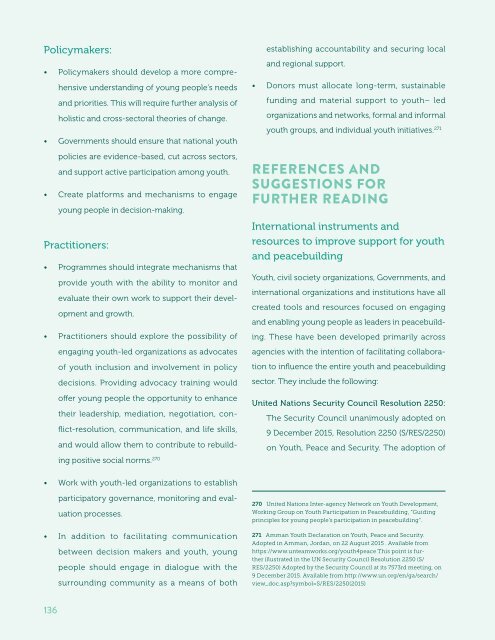YOUTH CIVIC
JieguI2U
JieguI2U
Create successful ePaper yourself
Turn your PDF publications into a flip-book with our unique Google optimized e-Paper software.
Policymakers:<br />
• Policymakers should develop a more comprehensive<br />
understanding of young people’s needs<br />
and priorities. This will require further analysis of<br />
holistic and cross-sectoral theories of change.<br />
• Governments should ensure that national youth<br />
policies are evidence-based, cut across sectors,<br />
and support active participation among youth.<br />
• Create platforms and mechanisms to engage<br />
young people in decision-making.<br />
Practitioners:<br />
• Programmes should integrate mechanisms that<br />
provide youth with the ability to monitor and<br />
evaluate their own work to support their development<br />
and growth.<br />
• Practitioners should explore the possibility of<br />
engaging youth-led organizations as advocates<br />
of youth inclusion and involvement in policy<br />
decisions. Providing advocacy training would<br />
offer young people the opportunity to enhance<br />
their leadership, mediation, negotiation, conflict-resolution,<br />
communication, and life skills,<br />
and would allow them to contribute to rebuilding<br />
positive social norms. 270<br />
establishing accountability and securing local<br />
and regional support.<br />
• Donors must allocate long-term, sustainable<br />
funding and material support to youth– led<br />
organizations and networks, formal and informal<br />
youth groups, and individual youth initiatives. 271<br />
REFERENCES AND<br />
SUGGESTIONS FOR<br />
FURTHER READING<br />
International instruments and<br />
resources to improve support for youth<br />
and peacebuilding<br />
Youth, civil society organizations, Governments, and<br />
international organizations and institutions have all<br />
created tools and resources focused on engaging<br />
and enabling young people as leaders in peacebuilding.<br />
These have been developed primarily across<br />
agencies with the intention of facilitating collaboration<br />
to influence the entire youth and peacebuilding<br />
sector. They include the following:<br />
United Nations Security Council Resolution 2250:<br />
The Security Council unanimously adopted on<br />
9 December 2015, Resolution 2250 (S/RES/2250)<br />
on Youth, Peace and Security. The adoption of<br />
• Work with youth-led organizations to establish<br />
participatory governance, monitoring and evaluation<br />
processes.<br />
• In addition to facilitating communication<br />
between decision makers and youth, young<br />
people should engage in dialogue with the<br />
surrounding community as a means of both<br />
270 United Nations Inter-agency Network on Youth Development,<br />
Working Group on Youth Participation in Peacebuilding, “Guiding<br />
principles for young people’s participation in peacebuilding”.<br />
271 Amman Youth Declaration on Youth, Peace and Security.<br />
Adopted in Amman, Jordan, on 22 August 2015 . Available from<br />
https://www.unteamworks.org/youth4peace This point is further<br />
illustrated in the UN Security Council Resolution 2250 (S/<br />
RES/2250) Adopted by the Security Council at its 7573rd meeting, on<br />
9 December 2015. Available from http://www.un.org/en/ga/search/<br />
view_doc.asp?symbol=S/RES/2250(2015)<br />
136


